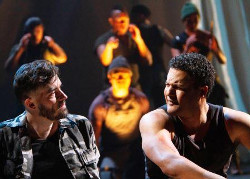|
The Noblest Roman Tragedy: "Julius Caesar" in Brooklyn
 |
| L-R: Matthew Amendt, as Cassius
and Brandon J. Dirden, as Brutus. Photo by Gerry Goldstein. |
Through
April 28
Theatre for a New Audience at Polonsky Shakespeare Center, 262 Ashland
Place, Brooklyn NY.
For performance schedule and tickets: 866-811-4111 or online at
www.tfana.org
Reviewed by Philip Dorian.
If your attention has wandered during the last third
of Shakespeare's "Julius Caesar," you are not alone, but
redemption is at hand. Theatre for a New Audience's portrayal of
the aftermath of the assassination of Caesar, running through April
28 at Polonsky Shakespeare Center in Brooklyn, is a revelation.
Following Cassius's conscription of Brutus, who rationalizes his
initial doubts, and the killing and funeral orations, all played
out grippingly, the ensuing violent power struggle is must-watch
Theatre.
"Julius Caesar" accounts what occurred in and after 44BCE,
the year of Caesar's murder, two years after he had assumed virtually
unlimited power as dictator. Fearing his further elevation ("…this
man would be a God"), certain nobles carried out his murder
in the name of the fading Roman Republic. The principal nobles,
Cassius and Brutus, were later driven out and defeated by the forces
of Caesar's disciple Marc Antony and the late emperor's great-nephew
and adopted son Octavius Caesar. And the rest is history. Literally.
While the play is ninety-five percent in verse, it
is short on poetic flourishes and imagery, making a naturalistic
approach, like this one, a good fit. Cassius (Matthew Amendt) is
a wily salesman, whose exchanges with Brutus (Brandon J. Dirden)
are alternately cajoling and heated.
 |
| Jordan Barbour as Marc Antony. Photo by Gerry
Goldstein. |
As much passes between their demeanors as in their
speeches, and once Brutus is onboard ("It must be his death"),
the conspiracy plays out. Familiar as it is, the run-up to the killing
is suspenseful, and the act itself is wrenching. The intermission
occurs after the Roman citizenry, fired up by Antony (Jordan Barbour)'s
"Friends, Romans, countrymen…" oration, stomps to
death the poet Cinna, unfortunately same-named as one of the conspirators.
That urgent cameo, enacted by Galen Molk such that you feel Cinna's
pain, is a virtual treatise on mob mentality.
So realistic is the Cassius-Brutus relationship that their later
argument over a bribery issue is like eavesdropping on a brothers'
squabble ("Brutus, bait not me; I'll not endure it").
They do make up, but family harmony is not to be. After ferocious
battles with their common enemies, both take their own lives, Cassius
in the mistaken belief that Brutus had been defeated (not yet) and
Brutus in regretful despair: "Caesar, now be still; I kill'd
not thee with half so good a will," as he runs on his dagger.
Director Shana Cooper's modernist approach suits the acting styles
– and vice versa. Dirden never loses sight of Brutus's lingering
doubts, even (or especially) as he is administering "the most
unkindest cut of all." Amendt keeps Cassius's frustration with
Brutus on the front burner, and Barbour grows into the role of Antony
as the character does in the play.
 |
| L-R: Merritt Janson and Brandon
J. Dirden. Photo by Gerry Goldstein. |
Merritt Janson and Tiffany Rachelle Stewart bring more substance
to Portia and Calpurnia, respectively, than I've seen in other productions.
Both leave no doubt of their devotion and the despair that foreshadows
husbands Brutus and Caesar's fate.
The precisely choreographed (by Erika Chong Shuch) battle scenes
are prolonged beyond necessity, but the schematics work. One squad
of a dozen or so plays both armies, with opposing sides alternately
facing downstage or up.
This play's many well-known phrases are integrated without pointing
them up, which is more praiseworthy than it should be. Casca, for
example, makes the "…Greek to me" sequence funny.
And in a less-is-more moment, the Soothsayer barely whispers (mouths,
really) "Beware the ides of March" into Caesar's ear.
It is the only Shakespearean "read my lips" I can recall.
[The Soothsayer (Michelle Hurst), Cicero (Emily Dorsch) and Artemidorus
(Juliana Sass), male characters who warn of the dangers of violence,
are pointedly cast here as women. The sight of Artemidorus being
forcibly dragged off after Caesar ignores her letter of warning
is particularly harrowing.]
While its theme of incipient tyranny imbues the play with relevance
to our time, it is ultimately a ‘Be careful what you wish
for' scenario. Impeachment in 44BCE (by dagger, but still) resulted
in chaos. A lesson to learn?
|




